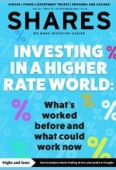Archived article
Please note that tax, investment, pension and ISA rules can change and the information and any views contained in this article may now be inaccurate.
What did we learn from the latest round of UK bank earnings?

When it came to their third-quarter earnings updates, none of the UK’s ‘Big Four’ high-street lenders could be said to have covered themselves in glory.
Shares in Barclays (BARC), HSBC (HSBA), Lloyds (LLOY) and NatWest (NWG) all declined on the day of their results, regardless of whether they were better, in line, or below forecasts.
While none of them explicitly warned on revenue or earnings, there was a distinct sense from reading the statements that we may have seen ‘the best of times’ in terms of net interest margins and expected credit losses.
The record pace of interest rate rises over the past 12 months meant they all earned more in net interest income than they did in the same three months last year, even though overall lending seems to have declined and net interest margins look to have already peaked.
Despite fears the global economic slowdown and cost-of-living crisis could cause companies and households to default on their debts, provisions for future bad loans were in line with expectations and well below those seen in the great financial crisis.
Lloyds, the UK’s largest mortgage lender, said asset quality was ‘resilient, with credit performance across portfolios largely stable in the quarter and remaining similar or favourable to pre-pandemic experience,’ meaning it wasn’t seeing any major signs of stress among borrowers.
Barclays increased its UK provisions slightly as a result of higher rates and falling house prices, although arrears in areas like credit cards were lower and consumer demand for credit was steady, but across the board we get the sense the only way for loan losses going forward is up.
Where the banks dipped out was in deposits, where customers rushed to take surplus cash out of zero-interest current accounts and stick it in interest-bearing term accounts in a ‘search for yield’, a trend which Barclays noted had increased over the course of the year.
Also, any illusions that UK investment bankers are a match for their Wall Street peers – regardless of the silly amounts they get paid – were quickly disabused with earnings from trading dwarfed by the figures reported by the likes of Goldman Sachs (GS:NYSE) and JPMorgan Chase (JPM:NYSE).
Our final takeaway from this quarter’s earnings is, if earnings aren’t up to scratch then there is always the option of buying back shares: Lloyds was punished for not increasing the size of its repurchase plan, while HSBC avoiding a major drubbing after posting disappointing figures by announcing a bigger-than-expected buyback.
Important information:
These articles are provided by Shares magazine which is published by AJ Bell Media, a part of AJ Bell. Shares is not written by AJ Bell.
Shares is provided for your general information and use and is not a personal recommendation to invest. It is not intended to be relied upon by you in making or not making any investment decisions. The investments referred to in these articles will not be suitable for all investors. If in doubt please seek appropriate independent financial advice.
Investors acting on the information in these articles do so at their own risk and AJ Bell Media and its staff do not accept liability for losses suffered by investors as a result of their investment decisions.
Issue contents
Feature
Great Ideas
News
- Downtrading trend puts Unilever and Reckitt pricing power to the test
- US auto strikes deal now has big implications for inflation and Fed policy
- What did we learn from the latest round of UK bank earnings?
- Ascential shares surge 30% on £1.4 billion divestments to focus on events
- Whirlpool shares in a spin amid big questions on white goods margin and earnings outlook
- Berkshire Hathaway continues to benefit from a strong US economy

 magazine
magazine








